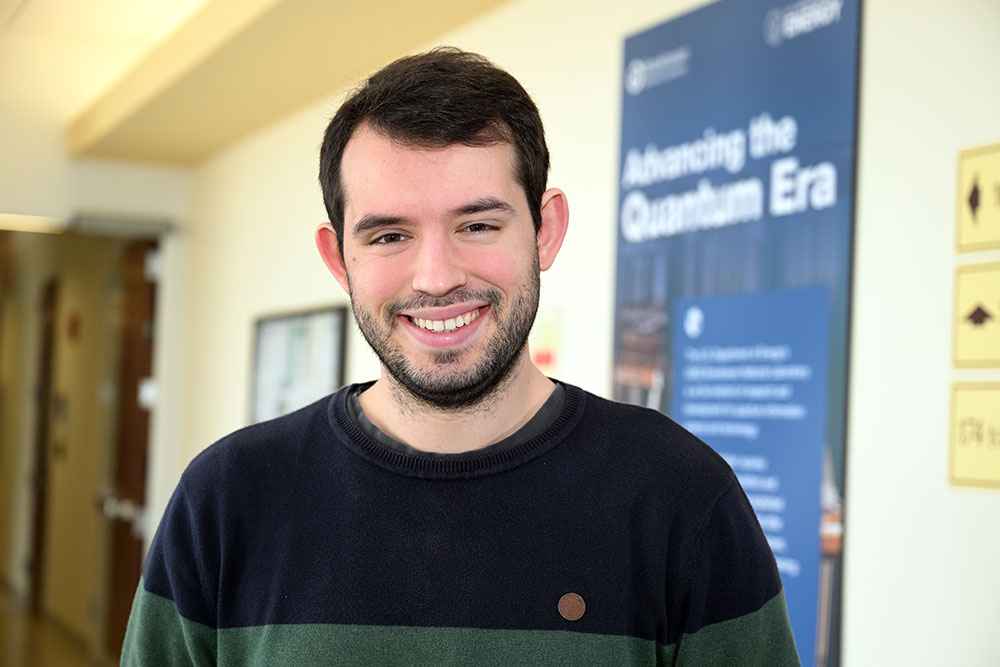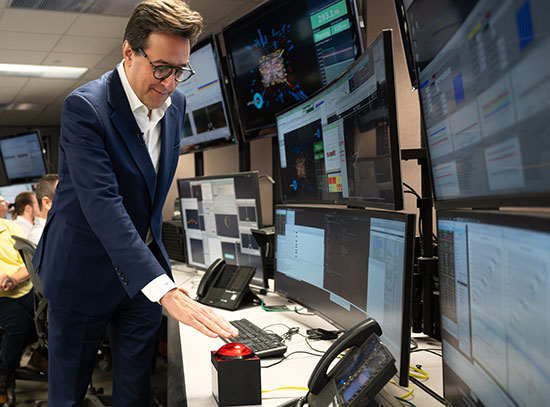João Barata Awarded CERN Fellowship
The theoretical physicist, who works with the Co-Design Center for Quantum Advantage to explore high energy and nuclear physics applications of quantum computing, will continue his research at CERN
April 11, 2024
João Barata, a physicist in the Nuclear Theory Group at the U.S. Department of Energy’s (DOE) Brookhaven National Laboratory, has received a fellowship at CERN, the European Organization for Nuclear Research. In October 2024, Barata will begin the three-year-long appointment in CERN’s Department of Theoretical Physics.
“This is Europe’s most prestigious postdoctoral position in high energy physics and nuclear physics, so we are thrilled that João received it,” said Raju Venugopalan, a distinguished scientist in Brookhaven’s Nuclear Theory Group and Barata’s mentor.
“I am grateful for the opportunity to continue my career at CERN,” Barata said. “But I could not have gotten to this stage without my experience in the Nuclear Theory Group at Brookhaven and the support from other members of my group.”
As a theoretical physicist, Barata contributes to the Co-Design Center for Quantum Advantage (C2QA), a national quantum information science research center led by Brookhaven Lab and funded by DOE. His research explores how quantum computing could help solve questions posed by high energy and nuclear physicists, such as how the universe works at a fundamental level.
For example, Barata studies the quark-gluon plasma (QGP) generated by colliding heavy nuclei at nearly the speed of light. This soup of quarks and gluons—the subatomic particles that make up protons and neutrons—is created at the Relativistic Heavy Ion Collider (RHIC), a DOE Office of Science user facility for nuclear physics research at Brookhaven National Laboratory, and at CERN’S Large Hadron Collider (LHC) in Switzerland, where Barata will complete his fellowship.
In particular, he works with quantum chromodynamics (QCD), the theory of the strong nuclear force that holds quarks and gluons together. Scientists, like Barata, are striving to understand how nature behaves at the smallest scale through this theory, but there are technical limitations. So, scientists often study simpler quantum field theories that share several properties with the full QCD.
“We can run computer simulations for these quantum field theories and use the results to make predictions related to QCD,” Barata explained.
But even with the simpler quantum field theories, the computing power needed to simulate the behavior of quarks and gluons exceeds that of classical computers.
“Quantum computer technology could solve these technical problems and enable physicists to ask questions about the real-time evolution of quantum field theories,” said Barata.
Throughout his fellowship at CERN, Barata will continue using quantum technologies and methods to study quantum field theories and ultimately QCD theory.
“Quantum computing will have a transformative impact on the field of nuclear physics. This will require significant investment in quantum technologies and interdisciplinary collaboration. But most importantly, we need to train a new generation who can ensure quantum computing reaches its full potential,” said Venugopalan, who also contributes to C2QA’s nuclear theory efforts. “Joao’s experience with C2QA has put him at the forefront of this new generation of nuclear theorists and we are eager to see how he employs his expertise in the next stage of his career at CERN.”
Barata received a bachelor’s degree in engineering physics from the Higher Technical Institute in Portugal and a master’s degree in theoretical physics from the Imperial College London in 2017 and 2018, respectively. He received a Ph.D. in nuclear and particle physics from the University of Santiago de Compostela in Spain in 2021. Barata joined Brookhaven Lab as a postdoctoral fellow in 2022.
Brookhaven National Laboratory is supported by the Office of Science of the U.S. Department of Energy. The Office of Science is the single largest supporter of basic research in the physical sciences in the United States and is working to address some of the most pressing challenges of our time. For more information, visit science.energy.gov.
Follow @BrookhavenLab on social media. Find us on Instagram, LinkedIn, X, and Facebook.
2024-21815 | INT/EXT | Newsroom










